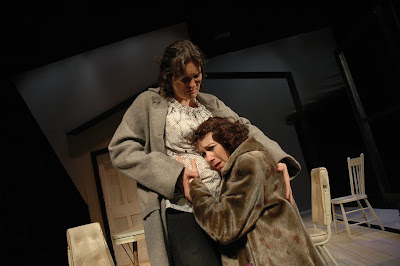When a play freely adapted from Lorca begins with a gunshot, you know with almost one hundred percent certainty that the story is going to end badly. Such is the case with RCA Theatre Company’s Rocking The Cradle, adapted by Des Walsh and playing at Tarragon Theatre (Mainspace) until December 13th, 2009.
The play was adapted from Lorca’s Yerma, and tells the story of Joan, a young wife from a tiny, remote village in Newfoundland who becomes increasingly obsessed and frantic about having a child despite the fact that her pragmatic fisherman husband, Vince, is doing everything in his power to prevent her from getting pregnant. The play has a distinct salty sea style which begins with a fiddle and is interspersed with haunting a capella Newfoundland, British and Irish shanties. Walsh’s language, in Newfoundland’s unique dialect, is at times beautifully lyrical and sounds like grammatically incorrect poetry. However, beyond establishing a connection between the experience of women in 1934 rural Spain and women in rural Newfoundland a generation later, I was unsure what Walsh’s intention was in creating this adaptation.
In the show’s programme Andrea Romaldi wrote a very thorough essay on Newfoundland after 1949 and spoke about the government’s centralization and resettlement program. Walsh’s play, however, only faintly alludes to the historical themes and context that Romaldi has given us and therefore, despite the wind and the spray, the dialect and the damn crows that anyone who has spent time on the East Coast knows all too well, Newfoundland seems strangely absent from this story. The idea of the government moving an entire community and seeking to resettle its residents elsewhere so that they would be closer to the centre of technology seems like a fascinating plot point for a play around which the characters of Lorca’s play could have been woven.
The characters and their plight also seemed too clearly constructed as the innocent, naïve, yet obviously unsatisfied and heartbroken, wife and the entirely unsympathetic, brooding, volatile, unreasonable husband. The entrance of Tom, the good natured, kind neighbor who has an obvious infatuation with Joan does not have a strong enough bearing on the plot of the play and only provides the audience with a hazy sense of “what could have been” rather than providing a sense of complication and tension to the story. It seemed as though all the ingredients for a tragic love story as epic as Anna Karenina were possible here, and yet Walsh had snuffed them out.
Graeme S. Thomson kept the audience distanced from the action by means of a huge screen which separated the actors behind it. Although I did not find this experience necessarily isolating, it felt strange and I am not sure that I fully understand the reason for Thomson’s choice. The actors all gave fine performances in this play, although at times the dialogue seemed so contrived that the delivery of the lines fell flat or seemed unnatural, even with the best of intentions. Greg King gives an especially lovely, entirely charming, performance as Tom, showing off his gorgeous singing voice and capturing the spirit of a goodhearted small town boy. Ruth Lawrence is fantastic as Joan. She initially fills her with such a simple, giggling radiance and then redirects all the same energy into her sense of despair and lonely frustration.
I have never seen Lorca’s Yerma, so I cannot speak to whether or not I would feel that its story would still resonate with a contemporary audience. However, for Walsh, it seems as though if a playwright chooses to adapt a play and to change its setting, both historically and geographically, and to premiere it for a 2009 audience, that each of these variables should have played a significant role in determining the arc of the play. Otherwise, the adaptation fails to achieve a heartbeat of its own and becomes little more than a thickly Canadianized translation.
The play was adapted from Lorca’s Yerma, and tells the story of Joan, a young wife from a tiny, remote village in Newfoundland who becomes increasingly obsessed and frantic about having a child despite the fact that her pragmatic fisherman husband, Vince, is doing everything in his power to prevent her from getting pregnant. The play has a distinct salty sea style which begins with a fiddle and is interspersed with haunting a capella Newfoundland, British and Irish shanties. Walsh’s language, in Newfoundland’s unique dialect, is at times beautifully lyrical and sounds like grammatically incorrect poetry. However, beyond establishing a connection between the experience of women in 1934 rural Spain and women in rural Newfoundland a generation later, I was unsure what Walsh’s intention was in creating this adaptation.
In the show’s programme Andrea Romaldi wrote a very thorough essay on Newfoundland after 1949 and spoke about the government’s centralization and resettlement program. Walsh’s play, however, only faintly alludes to the historical themes and context that Romaldi has given us and therefore, despite the wind and the spray, the dialect and the damn crows that anyone who has spent time on the East Coast knows all too well, Newfoundland seems strangely absent from this story. The idea of the government moving an entire community and seeking to resettle its residents elsewhere so that they would be closer to the centre of technology seems like a fascinating plot point for a play around which the characters of Lorca’s play could have been woven.
The characters and their plight also seemed too clearly constructed as the innocent, naïve, yet obviously unsatisfied and heartbroken, wife and the entirely unsympathetic, brooding, volatile, unreasonable husband. The entrance of Tom, the good natured, kind neighbor who has an obvious infatuation with Joan does not have a strong enough bearing on the plot of the play and only provides the audience with a hazy sense of “what could have been” rather than providing a sense of complication and tension to the story. It seemed as though all the ingredients for a tragic love story as epic as Anna Karenina were possible here, and yet Walsh had snuffed them out.
Graeme S. Thomson kept the audience distanced from the action by means of a huge screen which separated the actors behind it. Although I did not find this experience necessarily isolating, it felt strange and I am not sure that I fully understand the reason for Thomson’s choice. The actors all gave fine performances in this play, although at times the dialogue seemed so contrived that the delivery of the lines fell flat or seemed unnatural, even with the best of intentions. Greg King gives an especially lovely, entirely charming, performance as Tom, showing off his gorgeous singing voice and capturing the spirit of a goodhearted small town boy. Ruth Lawrence is fantastic as Joan. She initially fills her with such a simple, giggling radiance and then redirects all the same energy into her sense of despair and lonely frustration.
I have never seen Lorca’s Yerma, so I cannot speak to whether or not I would feel that its story would still resonate with a contemporary audience. However, for Walsh, it seems as though if a playwright chooses to adapt a play and to change its setting, both historically and geographically, and to premiere it for a 2009 audience, that each of these variables should have played a significant role in determining the arc of the play. Otherwise, the adaptation fails to achieve a heartbeat of its own and becomes little more than a thickly Canadianized translation.
Rocking the Cradle plays at the Tarragon Mainspace until December 13th, 2009. For more information please call 416.531.1827 or visit this website.







